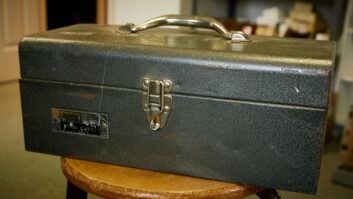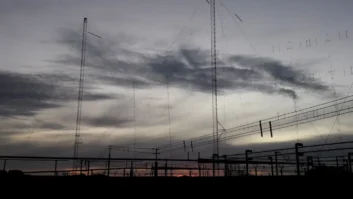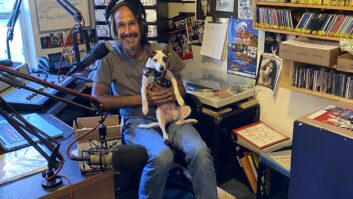Launched in September, Beasley Station Is Hopeful About Eventual Acceptance
Does something make a noise if there’s nobody there to hear it?
A small but growing number of commercial stations – approximately 70, as of December – are confronting that age-old riddle as they debut digital multicast channels to tiny audiences.
The small audiences are predictable, given the general dearth of listening devices. But creative sampling strategies, optimistic projections on consumer acceptance and the potential for capturing disenfranchised listeners have given at least some programmers reasons to be enthusiastic – if patient – while audiences find their way to the technology.
Consider Bob Barnett, program director for Beasley Broadcasting’s WKIS(FM) – “KISS Country” – in Miami.
In late September, the 25-year-old heritage country station launched “Gretchen 99.9” on HD-2. The station was inspired by, and named after, award-winning country star Gretchen Wilson.
“The whole thing was carefully conceived as far as how we were going to launch the product and how we were going to market it with little to no dollars,” said Barnett. “The launch coincided with the release of Gretchen’s second album, ‘All Jacked Up.’ And it’s no coincidence that she’s co-headlining, with Keith Urban, our KISS Country Chili Cookoff in January.
“It’s a chance at that point to expose Gretchen’s radio station to 30,000 people standing out in a field.”
Barnett said that while the station waits for HD Radio players to start coming into the market in significant numbers in 2006, it is using other strategies to bridge the technology gap and let listeners sample the new product.
Those strategies include using the kiosk approach at KISS Country events and streaming audio on WKIS’s Web site.
“We want to give them an incentive to go out and buy a receiver. I think they’ll discover that in addition to Gretchen 99.9, there will be plenty of other choices down the road, too.”
Filling holes
Barnett says a valuable consideration in launching Gretchen 99.9 was that it gives him an opportunity to lure back listeners that commercial radio in his market had lost.
“In South Florida, if you’ve got 10 presets on your radio, you don’t have 10 stations you can listen to unless you can understand Spanish or you’re into hip-hop. This is a real challenge that faces a lot of broadcasters at the moment.
“We spent four to six months in planning this. We asked ourselves, ‘What are we going to do to fill a hole in this marketplace?'”
The hole he refers to is for a harder-edged type of country music that has vanished from the dial in South Florida, as in many other markets.
“A lot of middle-aged guys have found country to be a little too soft for them. When Gretchen launched her career a couple of years ago, it made country safe again to rebel, to drink, to party, to be rednecked and proud of what it is. But as a format, we’ve left a lot of it on the table with no place to play,” he said.
“What we’ve done with Gretchen 99.9, we’ve gone back and fetched some of these harder titles and put them into the mix.”
Barnett said Gretchen 99.9 will showcase music from artists like Hank Williams Jr., Charlie Daniels, the Allman Brothers, Montgomery-Gentry, Lynyrd Skynyrd, Travis Tritt, Toby Keith, and of course the station’s namesake.
“If KISS Country, marketing-wise and product-wise, needs to be a 25-54 female-targeted station to succeed, we’re giving the alter ego a more male-leaning sound. We’ve tried to create an environment for both these radio stations to fit their constituencies, knowing full well that there are a lot of guys out there who listen to KISS Country because they’ve got nowhere else to go.
“But by giving them an alternative, we may be able to hold the whole pool of people here.”
Early listening
Initial response seems to bear out Barnett’s strategy, he said.
With little fanfare, the station launched in late September. While most of the feedback has come in response to the Internet stream, Barnett said those indicators are positive.
“The only publicity we had was an article in the paper the day before we launched the link on our Web site. When we went live, the thing hadn’t been up 30 minutes before we had an e-mail from a guy offering his first critique of the music. We were 30 minutes old and we’d already gotten our first complaint,” Barnett said with a laugh.
By one measure, it’s a success; within a month of launch, Gretchen 99.9 represented 50 percent of time spent listening on the KISS Country site.
“We have not mentioned it on our airwaves yet. Aside from the newspaper article and an e-mail blast to our loyal listener club, it’s had no marketing at all,” Barnett said.
“Once we know the status of when receivers will be available in the market, we’ll start promoting the station on our airwaves. But the fact is that people found it, and they’re spending so much time with it I’ve had to slow down some of the rotations. I didn’t anticipate people hanging around as long. Obviously the people who have found the streaming are enjoying it and are staying around.”
Promoting the concept
Barnett said for now, he’s less concerned about promoting Gretchen 99.9 as a specific channel than promoting the concept of HD Radio.
“There are no commercials in the standard sense. The ‘commercial’ that’s running now is a 24-hour infomercial all about HD. It’s about the fact that it’s coming, it’s a free sample, it’s a different format.
“We need to be able, as an industry and a station, to self-promote this thing effectively,” he said. “We need Gretchen 99.9 to serve two purposes: One, to have exciting content of its own so that it can generate listenership. And two, it needs to be a promo, a marketing concept that can sell HD receivers in the marketplace so that this thing has a future and doesn’t die on the vine like AM stereo or quad.”












